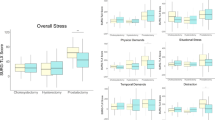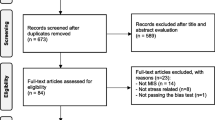Abstract
Prior research has indicated that novices experienced a beneficial stress profile in the robotic surgery (da Vinci) training environment when compared to the laparoscopic surgery training environment. The objective of this study was to assess whether this finding generalizes to expert surgeons. Towards that end, first-year residents’ and attending surgeons’ performances and subjective stress experiences were assessed in a surgical training task that was performed with the da Vinci and laparoscopic surgery interfaces. This study indicated that both groups exhibited superior performance and lower stress with the da Vinci surgical system than the laparoscopic system. The results provide further support for the sensitivity of the Dundee Stress State Questionnaire in identifying different stress responses experienced by trainees and experts in the minimally invasive surgery environment.

Similar content being viewed by others
References
Varela JE, WilsonSE Nguyen NT (2010) Laparoscopic surgery significantly reduces surgical-site infections compared with open surgery. Surg Endosc 24:270–276
Cuschieri A (1995) Whither minimal access surgery: tribulations and expectations? Am J Surg 169:9–19
Mattei P (2007) Minimally invasive surgery in the diagnosis and treatment of abdominal pain in children. Curr Opin Pediatr 19:338–343
Reinhardt-Rutland AH, Annett JM, Gifford M (1999) Depth perception and indirect viewing: reflections on minimally invasive surgery. Int J Cogn Ergon 3:77–90
Gallagher AG, McClure N, McGuigan J, Ritchie K, Sheehy NP (1998) An ergonomic analysis of the fulcrum effect in the acquisition of endoscopic skills. Endoscopy 30:617–620
Cunningham HA (1989) Aiming error under transformed spatial mappings suggests a structure for visual-motor maps. J Exp Psychol Hum Percept Perform 15:493–506
Welch RB, Bridgeman B, Anand S, Browman K (1993) Alternating prism exposure causes dual adaptation and generalization to a novel displacement. Percept Psychophys 54:195–204
Rassweiler J, Frede T (2002) Geometrie der laparoskopie, telechirurgie, training und telementoring. Urologe A 41:131–143
Reyes JM, Smaldone MC, Uzzo RG, Viterbo R (2012) Current status of robot-assisted partial nephrectomy. Curr Urol Rep 13:24–37
Rassweiler J, Hruza M, Teber D, Su LM (2006) Laparoscopic and robotic assisted radical prostatectomy—critical analysis of the results. Eur Urol 49:612–624
Hockey GRJ (1997) Compensatory control in the regulation of human performance understress and high workload: a cognitive-energetical framework. Biol Psychol 45:73–93
Frankenhaeuser M (1986) A psychobiological framework for research on human stress and coping. In: Appley MH, Trumbull R (eds) Dynamics of stress: physiological, psychological, and social perspectives. Plenum Press, New York, pp 101–116
Matthews G, Joyner L, Gilliland K, Campbell S, Falconer S, Huggins J (1999) Validation of a comprehensive stress state questionnaire: Towards a state “Big Three”. In: Mervielde I, Deary TJ, De Fryt F, Ostendorf F (eds) Personality psychology in Europe, vol 7. Tilburg University Press, Tilburg, pp 335–350
Matthews G, Campbell SE, Falconer S (2001) Assessment of motivational states in performance environments. In: Proceedings of the Human Factors and Ergonomics Society Annual Meeting, vol 45, pp 906–91
Matthews G, Campbell SE, Falconer S, Joyner LA, Huggins J, Gilliland K, Grier R, Warm JS (2002) Fundamental dimensions of subjective state in performance settings: task engagement, distress, and worry. Emotion 2:315–340
Klein MI, Warm JS, Riley MA, Matthews G, Gaitonde K, Donovan JF (2008) Perceptual distortions produce multidimensional stress profiles in novice users of an endoscopic surgery simulator. Hum Factors 50:291–300
Klein MI, Warm JS, Riley MA, Matthews G, Doarn C, Donovan JF, Gaitonde K (2012) Mental workload and stress perceived by novice operators in the laparoscopic and robotic minimally invasive surgical interfaces. J Endourol 26:1089–1094
Wetzel CM, Kneebone RL, Woloshynowych M, Nestel D, Moorthy K, Kidd J, Darzi A (2006) The effects of stress on surgical performance. Am J Surg 191:5–10
Arora S, Sevdalis N, Nestel D, Tierney T, Woloshynowych M, Kneebone R (2009) Managing intraoperative stress: what do surgeons want from a crisis training program? Am J Surg 197:537–543
Zuckerman M (1976) General and situation-specific traits and states: new approaches to assessment of anxiety and other constructs. In: Zuckerman M, Spielberger CD (eds) Emotions and anxiety: new concepts, methods, and applications. Lawrence Erlbaum, Oxford, pp 133–174
Matthews G, Westerman SJ (1994) Energy and tension as predictors of controlled visual and memory search. Pers Individ Dif 17:617–626
Acknowledgments
This study was supported by a grant awarded by Intuitive Surgical, Inc. to Martina I. Klein.
Conflict of interest
Dr. Wren previously served as a consultant and currently serves as a proctor for Intuitive Surgical, Inc. Dr. Gaitonde has served previously as a proctor for Intuitive Surgical, Inc. The remaining authors declare that they have no conflict of interest.
Author information
Authors and Affiliations
Corresponding author
Rights and permissions
About this article
Cite this article
Klein, M.I., Mouraviev, V., Craig, C. et al. Mental stress experienced by first-year residents and expert surgeons with robotic and laparoscopic surgery interfaces. J Robotic Surg 8, 149–155 (2014). https://doi.org/10.1007/s11701-013-0446-8
Received:
Accepted:
Published:
Issue Date:
DOI: https://doi.org/10.1007/s11701-013-0446-8




